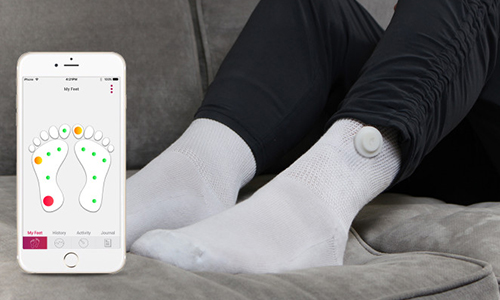Siren launches smart sock for diabetes patients, announces $3.4M in funding
April 2, 2018
Source: Mobile Health News
 994
994

San Francisco-based microsensor textile company Siren has announced the first product using its proprietary Neurofabric material. The Siren Diabetic Sock and Foot Monitoring System and its accompanying app monitor wearers’ foot temperature as an early warning sign of inflammation and, subsequently, diabetic foot ulcers.
The company, which was founded in 2015, also announced that it has raised $3.4 million in seed funding, from DCM, Khosla Ventures, and Founders Fund.
“We built this technology because foot ulcers are the most common, costly, and deadly complication for people with diabetes, yet there was no way to continuously monitor for these massive problems,” Ran Ma, CEO and co-founder of Siren, said in a statement. “Our Neurofabric has endless applications across healthcare, sports, military, and fashion, but it was obvious to us that solving this specific problem is where we had to start, because it impacts so many and can mean the difference between losing a limb or not.”
Because the Neurofabric textile is built with its microsensors embedded directly into the fabric, Siren said that the material can be cheaply and efficiently produced on standard industrial equipment. Further, garments made from the material resemble and feel like any other piece of clothing to the wearer.
Siren’s newly launched smart sock provides wearers continuous, clinical-grade temperature monitoring throughout the day. Through the app or online web portal, wearers can view the current temperature as measured at six points on the user's foot, and receive a push notification or text message when an increase is detected.
The socks themselves are machine washable and dryer-friendly and do not need to be recharged. Currently, customers can pre-order a monthly subscription — which includes the app, live support, and five pairs of the socks mailed every six months — for $19.99 monthly.
Diabetic foot ulcers have long been the target of medical tech; Calgary, Alberta-based Orpyx Medical Technologies, for example, was founded in 2010 and sells a connected shoe insole that can help detect foot numbness. More recently, Sensoria Health and Optima Molliter announced a smart shoe that offloads weight from the wearer’s foot and actively notifies care teams of user noncompliance.
By DduRead more on
- Bayer’s Kerendia approved in the US to slow CKD in type 2 diabetes patients August 26, 2021
- Autoantibody order, timing predict genetically at-risk children most likely to get type 1 diabetes October 30, 2020
- Machine Learning Applied to Manage Treatment-Resistant Depression September 3, 2018
- Merck’s New Digital Diabetes Coaching to Educate and Manage Patients August 31, 2018
- UK Advertising Regulator Bans Natural Cycles’ Facebook Ad August 31, 2018
your submission has already been received.
OK
Subscribe
Please enter a valid Email address!
Submit
The most relevant industry news & insight will be sent to you every two weeks.



